【With Template】Creating and Automating SEO Reports Using Search Console and GA4 | Essential Items Explained Thoroughly
This article is aimed at those who want to efficiently create SEO reports. It clearly explains the key points to cover in an SEO report, how to create reports using the Search Console management screen, and methods to automate SEO reporting.
Furthermore, we introduce a useful SEO report template, so if you don’t have time for report tasks, please make use of it. With the handy Looker Studio (formerly Data Portal) free connector for Search Console and GA4, you can easily create clear and understandable SEO reports like the ones described below.
Popular Template: A SEO Template Popular for Reporting to Clients and Within Organizations
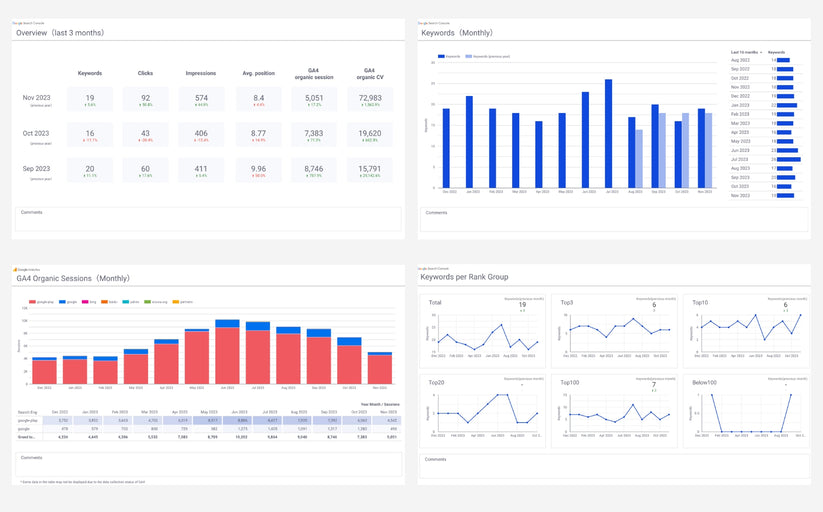
Quote: SEO monthly report template[4011]
Demo Report
Report detail
What is an SEO Report?
An SEO report is a document that summarizes the contribution of SEO to business and the performance of search engines, and is used to report to clients or superiors.
The primary goal of an SEO report is "to verify the return on investment of SEO and to decide future policies." Therefore, it is important to cover content that aligns with this purpose. In this article, we also introduce SEO report templates used in Search Console and GA4, which are widely used, so please refer to them.
Key Points to Cover in SEO Reports
The items to include in an SEO report of course vary depending on each company's SEO objectives and strategies, but there are common items that everyone should check. Here, we explain these points by dividing them into types of reports and items.
Types of Reports
- Sessions and conversions via GA4's Organic Search: Verify the return on investment of SEO by checking conversions and revenue (sales) through SEO.
- Number of impressions, clicks, and average position in Google Search Console: Check how the performance of Google's search engine has changed.
- Monthly and daily trends of each KPI: Check how each KPI has trended on a monthly and daily basis.
- Ranking trends of target keywords: Check the average ranking trends of target keywords you aim to rank high for.
- Transition of keyword numbers by ranking group: To get a more comprehensive view of SEO rankings, for example, check the number of keywords ranked within the top 3 positions. This is effective when there are a very large number of target keywords.
- Keywords with significant changes compared to the previous month: Check keywords that have significantly increased or decreased in clicks compared to the previous month.
- List of all keywords and pages: Check a list of all keywords and pages that have contributed to SEO.
Essential KPIs to Include in an SEO Report
Each report's dimensions and metrics should cover the following items:
- Number of Keywords: The unique number of keywords that resulted in links to your site in user search results. This can be set using calculated fields based on data from Google Search Console.
- Number of Clicks: The unique number of keywords that resulted in links to your site in user search results, as indicated by Google Search Console's "Clicks."
- Number of Impressions: The number of times links to your site were displayed in user search results, as indicated by Google Search Console's "Impressions."
- Average CTR: The ratio of clicks to impressions, as indicated by Google Search Console's "Average CTR."
- Average Position: The average position of your site in search results, as indicated by Google Search Console's "Average Position."
- Number of Sessions: The number of visits to the website, as indicated by GA4's "Sessions." For example, if a user visits the website twice, the session count is 2.
- Conversions: The total of conversion events set in GA4, as indicated by GA4's "Conversions."
- Keywords: The keywords users searched for, as indicated by Google Search Console's "Queries."
- Pages: The pages that were displayed in search results, as indicated by Google Search Console's "Pages."
Frequency of Data Update
While these items are generally sufficient for report content, simply listing this data is not meaningful. What's important is how to interpret these data and how to translate them into improvement actions, so make sure the data can be updated daily.
Creating Reports Using the Search Console Management Screen
1.Log in to Search Console2.Click 'Export' at the top right and select the format from the following three options:
- Google Spreadsheets
- Download as Excel
- Download as CSV

3.Log in to Search Console
The following data is contained in the respective tabs, so it will be complete once you customize it as needed.
- Query
- Page
- Country
- Device
- Appearance in Search
- Date
- Filter

How to Automate SEO Reporting
When submitting SEO reports to clients or internally, it's important to format the reports in a way that is easy for the reader to understand.
Manually downloading data from the management console each time to create a report is time-consuming. Therefore, if you need to create reports regularly, consider automating your reporting process.
In this article, we will introduce methods for automating SEO reports and the advantages and disadvantages of each.
Looker Studio (formerly Data Portal)
Looker Studio is a free reporting tool provided by Google that connects to various data sources and allows you to create easy-to-understand, fully automated reports.
Advantages
- Ability to create clear and easy reports for free
- Google's free Search Console connector automates data updates
Disadvantages
- Although simple to use, creating a report from scratch takes some time With In-House Plus, anyone can easily automate SEO reports
With 88studio's one-time purchase 'SEO Monthly Report Template for Looker Studio (4011),' you can complete a report in just 3 minutes by copying the report while referring to the manual.
(Related article)
Complete Guide to Using Search Console × Looker Studio (formerly Data Portal)
Google Spreadsheet's Search Console Add-on "Search Analytics for Sheets
The Google Spreadsheet's Search Console Add-on "Search Analytics for Sheets" is a free extension that allows exporting data from the Search Console to spreadsheets. Before the advent of Looker Studio, this method was commonly used, but many have now transitioned to the free Looker Studio. Google also recommends using Looker Studio.
Advantages
- Ability to export Search Console data to spreadsheets
Disadvantages
- Time-consuming to master its features
- Inability to create charts, resulting in less visually appealing reports
- System instability, including long loading times
SEO Report Automation Tool
The SEO report automation tool is a tool that automates SEO reports. This method was also commonly used before the appearance of Looker Studio, but more and more people are switching to Looker Studio, which is free to use.
Advantages
- There are unique features, such as being able to obtain data that cannot be obtained from the Search Console.
Disadvantages
- It takes time to master the tool.
- It costs money.
List of Convenient SEO Report Templates
The templates we are about to introduce are all created using Looker Studio and free connectors.
Refer to the 'Search Console × Looker Studio (formerly Data Portal) Complete Usage Guide' to create your own, or if you think it's a waste of time to start from scratch, feel free to purchase a template and customize it as you like.
Cover Page
On the cover page, you will include the client's name, the target month of the report, your own logo, your company name, and the department you belong to. This template, including the logo, is fully editable, so please feel free to arrange and use it as you wish.
Quote: SEO monthly report template[4011]
Summary of Results via SEO
Sessions and conversions via Organic Search in GA4
The first page is the most important for verifying the return on investment for SEO, showing sessions and conversions via GA4. This template includes a comment section at the bottom of every page except the cover, so let's also include how to interpret these data as a summary.
Quote: SEO monthly report template[4011]
Verifying return on investment is essential using GA4 data instead of Search Console. This is because GA4 data is more reliable for the following reasons.
- Search console only includes Google Search and GA4 includes search engines other than Google Search.
- Search Console measures even if the user closes the browser before clicking to open the page, while GA4 does not.
Google Search Console display count, number of clicks, and average listing position
Let's take a closer look at the KPIs for SEO next.
Quote: SEO monthly report template[4011]
SEO KPIs should cover the following items
- Keywords: This is the number of unique keywords for which a link to the site appears in a user's search results; it can be set in a calculation field based on Google Search Console data.
- Clicks: This is the "number of clicks" in Google Search Console. It is the unique number of keywords for which a link to your site appears in the user's search results.
- Impressions: This is the "number of times displayed" in the Google Search Console. This is the number of times a link to your site appears in a user's search results.
- Avg.Position: This is the "Average Publication Ranking" of the Google Search Console. It is the average ranking of the site when the site appears in the search results.
Monthly and daily trends for each KPI
Check how each KPI has performed on a monthly and daily basis.
Quote: SEO monthly report template[4011]
Quote: SEO monthly report template[4011]
The sample provided several keywords, but it is crucial to address the following KPIs at a minimum.
- keywords
- clicks
- Impressions
- Average CTR
- Average listing position
- Sessions via organic search in GA4
- Conversions via organic search in GA4
Trends in ranking for target keywords
To achieve top rankings, check the average ranking of your target keywords.
Quote: SEO monthly report template[4011]
An issue often encountered in SEO is when clicks increase but do not result in conversions. To address this, it's crucial to prioritize keywords expected to lead to conversions and track their progress in rankings.
To optimize search engine results, it's best to establish target keywords in the following manner.
- Check the landing page with the most conversions via organic search in GA4.
- Check the search queries for the above pages in the search console.
- Set the top XX positions of the above search queries as target keywords.
Keywords by ranking group
For a broader understanding of SEO rankings, consider examining the number of keywords per ranking group, such as those in the top 3 positions. This is especially helpful when dealing with a vast amount of target keywords.
Quote: SEO monthly report template[4011]
Keywords that experienced significant fluctuations compared to the previous month.
Find keywords that have significantly increased or decreased clicks on a month-over-month basis.
Quote: SEO monthly report template[4011]
List of all keywords and pages
Check the list to review all the keywords and pages that helped with SEO. However, only the top 1,000 positions are displayed on the Search Console management screen. Use Looker Studio (previously known as Google Data Studio) to generate reports without any keyword limit.
Quote: SEO monthly report template[4011]
Frequently Asked Questions
The Difference Between Site Impressions and URL Impressions
The former is aggregated at the site level, while the latter is aggregated at the page level, resulting in a difference in the method of aggregation. For example, if a search for a certain keyword displays three of your company's pages from 1st to 3rd place, and two of those pages are clicked, the results would be as follows.
| Impressions | Clicks | Avg.Position | |
| Site Impressions | 1 | 1 | 1 |
| URL Impressions | 3 | 2 | - |
I think the following basic rules are good because if the rules for distinguishing are ambiguous, the credibility of the data decreases.
Basically, use 'site impressions.' Only use 'URL impressions' when you want to analyze a page.
Dimensions and Metrics for 'Site Impressions' and 'URL Impressions
Note that 'Site Impressions' do not have a Landing Page dimension, whereas 'URL Impressions' do not have an Average Position metric.
Dimensions of 'Site Impressions'
- Date
- Device Category
- Country
- Google Property (type of search)
- Query
Metrics for 'Site Impressions'
- Clicks
- Impressions
- SiteCTR (Average CTR)
- Average Position (only for Site Impressions)
Dimensions of 'URL Impressions'
- Date
- Device Category
- Country
- Google Property (type of search)
- Query
- Landing Page (only for URL Impressions)
Metrics for 'URL Impressions'
- Clicks
- Impressions
- URL CTR (Average CTR)
What is a Search Type?
A search type refers to the kind of search targets that appear in Google's search results. There are various types, but it is basic to choose the web

Search Types for 'Site Impressions' and 'URL Impressions
Search Types for 'Site Impressions'
- Web
- Images
- Videos
- Latest Music
Search Types for 'URL Impressions'
- Web
- Images
- Videos
- Latest Music
- Recommended
- Google News"
How to review all search queries.
Please try the following method for exporting from Looker Studio to Google Sheets, as it is convenient.
Step1:
Select the ︙ (vertical 3-point leader) in the upper right corner of the figure and select export

Step 2:
Select "Google Spreadsheet" as the format, check the box for "Fit to Value Format", and select "Export".

Once you complete the task, the data will be automatically exported to a Google Spreadsheet. That's all you need to do.

(Related article)
[Looker Studio] How to export data from a graph to a Google Spreadsheet or CSV (Excel)
How to Display the Number of Search Queries Using a Calculated Field
By creating a calculated field using the COUNT_DISTINCT function, which counts the number of unique values, it becomes possible to display the number of search queries (number of keywords).
COUNT_DISTINCT(Query)

Over 2,000 companies use Looker Studio (former Data Portal) templates from 88studio
88studio offers a wide variety of customizable Looker Studio report templates to meet a variety of needs. If you want to automate report creation but find it difficult to create your own reports from scratch, use 88studio to make the most of your time.
Compatible with GA4, Search Console, and Google Ads. With a single purchase, you can create reports for an unlimited number of sites, copy reports in minutes, and customize them as you wish. Google Analytics expert Taku Ogawa is on board as an advisor to ensure that the templates are updated whenever there is a change in the GA4 specifications, so you can use it with peace of mind for years to come.
GA4 Monthly Report Template[4007]
This is a 61-page Looker Studio GA4 monthly report template that allows you to automate GA4 monthly reporting reports.
GA4 EC Monthly Report Template[4008]
This is a 61-page Looker Studio GA4 monthly report template that allows you to automate GA4 monthly reporting reports.
GA4 Standard Report Template[4004]
This is a versatile 18-page GA4 report template that allows anyone to easily automate reporting and streamline daily monitoring.
GA4 EC Standard Report Template[4012]
This is a 22-page universal GA4 report template for e-commerce sites that allows anyone to easily automate reporting for e-commerce sites and streamline daily monitoring.

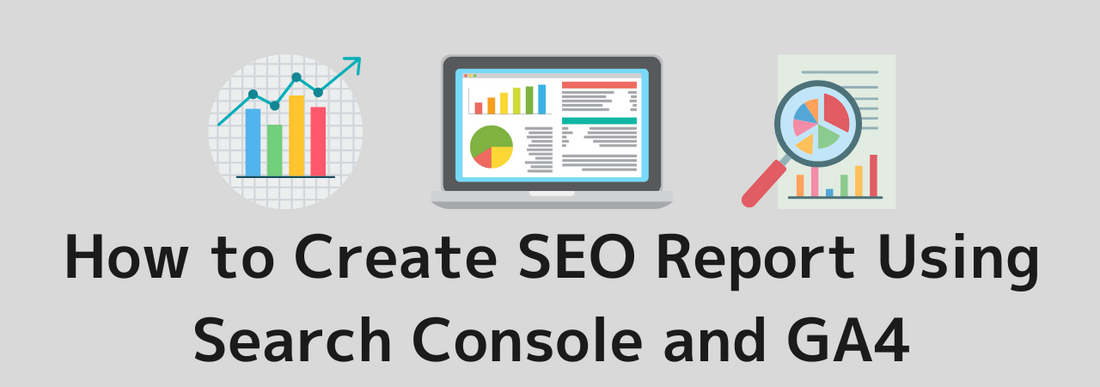









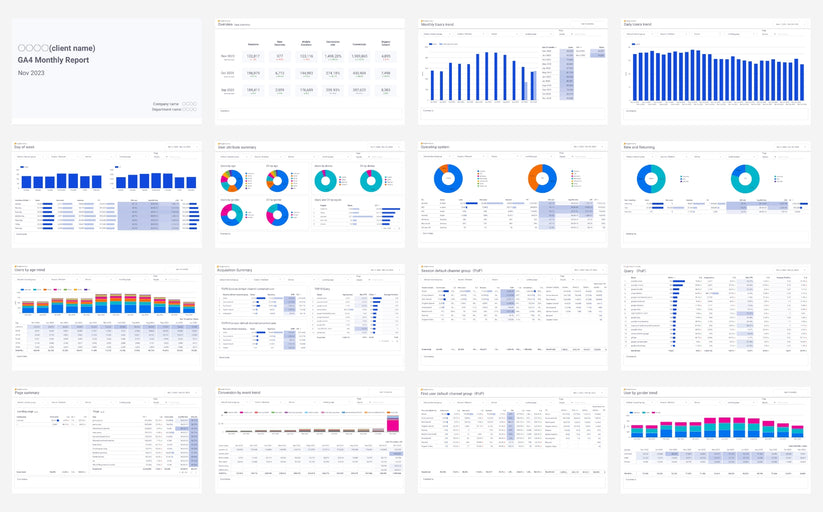
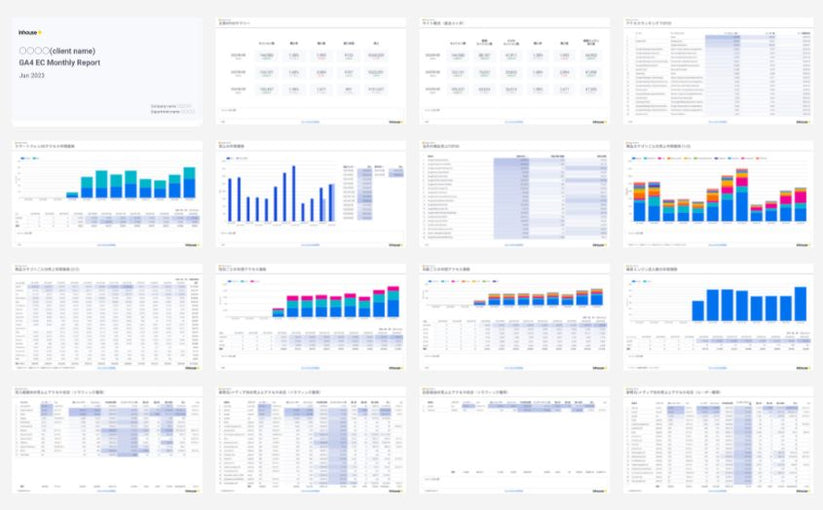
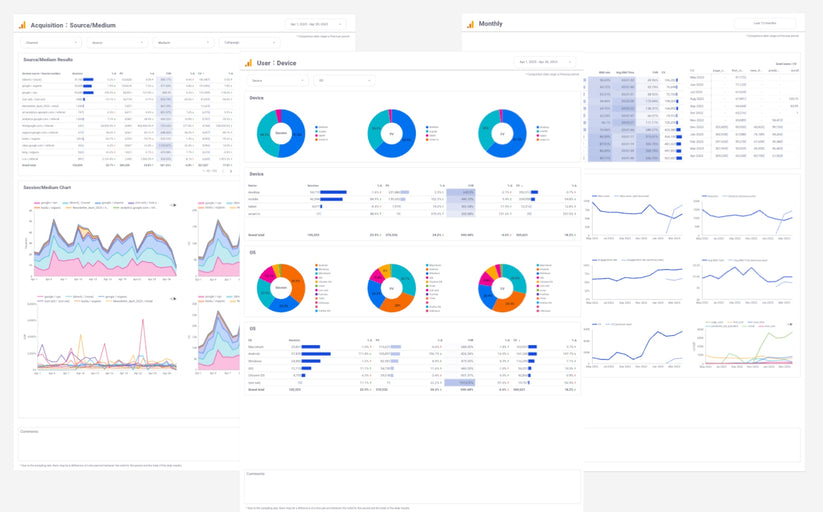
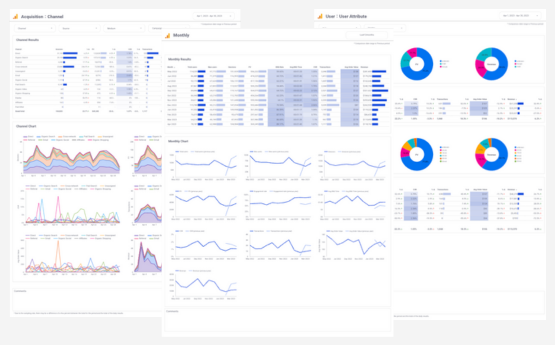
![GA4 Summary Report Template[4013]](http://88studio.io/cdn/shop/files/4013thumbnail.png?v=1733209235&width=533)
![GA4 Monthly Report Template[4007]](http://88studio.io/cdn/shop/files/4007_GA4-monthly-report-firstview_80551e9b-22ec-47d9-a375-29691372a34f.jpg?v=1702969299&width=533)
![GA4 EC Monthly Report Template[4008]](http://88studio.io/cdn/shop/files/4008_75c0c108-4e41-4fee-87ec-e7c823b6939d.png?v=1743466274&width=533)
![GA4 Standard Report Template[4004]](http://88studio.io/cdn/shop/files/4004_f67fd549-68fe-46c3-b8bc-57b0cad056ee.png?v=1740969729&width=533)
![GA4 EC Standard Report Template[4012]](http://88studio.io/cdn/shop/files/4012v2.0.png?v=1745371761&width=533)
![Google Ads Report Template[4003]](http://88studio.io/cdn/shop/files/4003_v2_1.png?v=1737458695&width=533)
![SEO Standard Report Template [4002]](http://88studio.io/cdn/shop/files/4002v2.0.png?v=1747814286&width=533)
![GA4 EC Basic Dashboard Template[4010]](http://88studio.io/cdn/shop/files/4010v2.0.png?v=1745966967&width=533)
![SEO Monthly Report Template[4011]](http://88studio.io/cdn/shop/files/4011_v2.png?v=1737028939&width=533)
![GA4 Dashboard Template[4009]](http://88studio.io/cdn/shop/files/4009v2.0.png?v=1740388404&width=533)